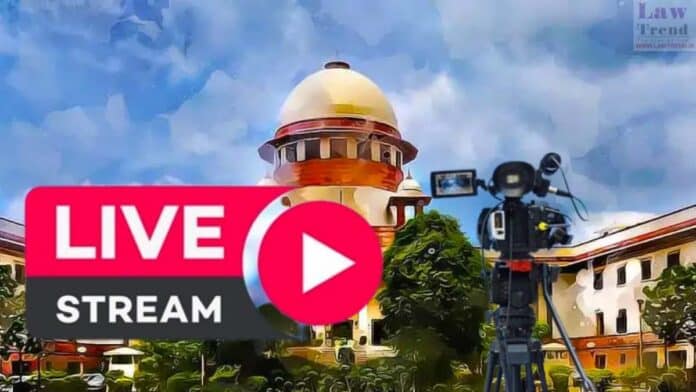The Supreme Court on Monday said it has started “action” and disposed of a plea moved by former RSS ideologue KN Govindacharya, seeking a direction for a special arrangement with YouTube to safeguard the copyright of its live-streamed proceedings in accordance with a 2018 judgment.
A bench comprising Chief Justice DY Chandrachud and Justices PS Narasimha and JB Pardiwala said the top court has already started working on evolving a mechanism to address the issue raised in the petition.
“We have started working. You can give suggestions to the secretary general (of the Supreme Court),” the bench told lawyer Virag Gupta, who appeared in the matter on behalf of Govindacharya, while disposing of the plea.

Additional Solicitor General Aishwarya Bhati, appearing in the court for the Centre, said she will apprise Gupta of the actions taken by the apex court registry in this regard.
Hearing the matter on January 2, the top court had said it was very easy to criticise someone or throw a stone at somebody after the petitioner contended that the court’s registry had not followed the directions in the 2018 verdict on live-streaming of proceedings.
The bench had asked Govindacharya’s counsel as to what modalities could be followed for live-streaming at a time when the National Informatics Centre (NIC) was saying it did not have sufficient technical infrastructure to live-stream court proceedings without third-party applications.
In its January 2 order, the bench had referred to an affidavit filed on behalf of the apex court’s secretary general in the matter.
The affidavit had said the full court of the top court had taken a decision at a meeting held on September 20 last year to start live-streaming of the proceedings before its Constitution benches.
“In compliance thereof, a decision was taken by the competent authority, directing the registry through the computer cell to work in close coordination with the National Informatics Centre (NIC), video-conferencing (VC) division to proceed with live-streaming on the NIC’s YouTube channel with effect from September 27, 2022,” the affidavit had said.
“It is submitted that the experience and knowledge that would be gained while live-streaming the court proceedings before the Constitution benches would eventually help in further improving the system and adopting the same for other court proceedings, as and when so decided,” it had said.
The affidavit had said due to technical limitations, the apex court’s secretary general, as a temporary measure, was constrained to avail the facilities of third parties to ensure a compliance of the court’s directions in the judgment, the decision of the full court and to uphold the principle of open courts.
“The above extract (of the affidavit) indicates that a temporary arrangement has been put into place in view of the decision in Swapnil Tripathi vs Supreme Court of India and in order to uphold the principle of open courts. Since the affidavit of the first respondent (secretary general) states that efforts are being adopted for a self-contained and self-reliant live-streaming platform, list the petition on April 10, 2023,” the bench had said in its order.
It had said an updated report be filed by the registry in the meantime.
On October 17 last year, the court agreed to hear Govindacharya’s plea seeking a direction for a special arrangement with YouTube for safeguarding the copyright over the court’s live-streamed proceedings, as held in the 2018 judgment.
Govindacharya has contended that live-streaming of the Supreme Court’s proceedings has to be done in accordance with the judgment that said the copyright over the live-streamed proceedings cannot be surrendered and the data can neither be monetised nor be used commercially by a platform, such as YouTube in the present case.







